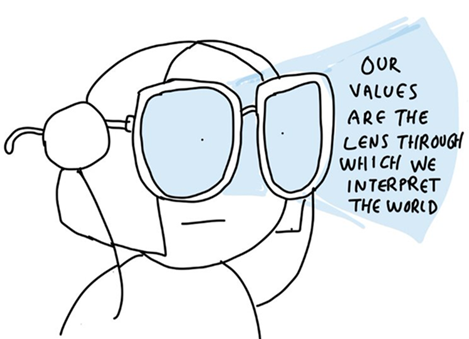
This is part of a blog series as we explore using Care Opinion in the last weeks and months of life, and in bereavement. It's co-authored by Jackie Le Fevre and Saskie Dorman.
You can read earlier blogs here:
- Learning from experiences and stories towards the end of life
- Beginning: 'the land of ifs and buts'
- What we learned in the early days
- Values inside stories
Care... Empathy... Interdependence...
"Everyone was welcoming and caring and it was very comforting to know that my mother was always treated with kindness and respect" Karen J
"In the last month of her life, they enabled us to concentrate on what was important to us...This was done with great empathy and care... I feel that we have been so lucky to have had so much brilliant treatment and care from so many people and agencies." veganmg64
In our earlier blog, we described how we mapped the values inside the way people share their stories and experiences of care towards the end of life. Many of the values we uncovered were relational:
Care/Nurture, Empathy, Family/Belonging, Generosity, Interdependence, Community Support, Education/Knowledge, Service/Vocation.
Several of these values were also common to stories related to COVID vaccination - a different experience of healthcare:
Interdependence, Generosity, Empathy, Education/Knowledge, Care/Nurture.
Such a significant overlap between the different contexts raised an important question.
Can we create the conditions for these values to thrive?
Answer: yes we can.
Jane Rickett of Dorset Healthcare University NHS Foundation Trust explains how the insights are being used in strengthening formal education and training for nurses:
“During our end of life education days we include conversations around advance care planning and discussions around “what matters most” and have been able to enhance this education with included discussions around interdependence and the importance of having open and honest conversations.This has provoked some really interesting conversations and learning for staff which we feel ultimately impacts of the care provided and supports the informed choices for patients and their loved ones. Learning from these stories are regularly shared with staff through education sessions and through end of life meetings where staff then are able to share with their colleagues to improve care for our patients and their families.”
Outside of ‘classrooms’ ongoing informal learning is vital too. Debbie Tallick-Wyatt of Lewis-Manning Hospice writes:
“We continue to use Care Opinion and have received some lovely stories from many patients too. I share all of these with the team and care opinion which has really helped us to look at what we could do differently and focus on what matters most to all of our patients.”
We have some further thoughts and recommendations shared below and would be interested to hear what you might add.
We could…
Show our care for each other
There are several ways we can deliberately show that we care about each other as people. Here are a few examples:
- Start with appreciation. This might be in a team meeting - including an initial check-in in which we’re invited to share something which has made us smile this week.
- Ask about and listen to what matters to each other.
- Instead of focusing initially on questions about someone’s medical conditions, take some time to get to know who and what matters to them.
Create the conditions for relational values - and people - to flourish
Sometimes bureaucratic processes can have unintended consequences. When we’re focused on ticking boxes to meet targets, it makes it harder to fully attend to what people need.
Enable working across organisational boundaries
People notice how we work together and organise ourselves (often more than we realise). Supporting people well often includes working effectively with colleagues from different teams or organisations, and witnessing disagreements or disconnects between individuals or teams undermines confidence.
- Remember our common, shared purpose to do what’s right from the perspective of the people and communities we’re here to support.
- Show we are part of the same team.
Enable cross-organisational learning and sense-making
People experience care across teams and organisational boundaries. So it makes sense for teams and organisations to work together to:
- Understand people’s experiences and what matters to them
- Invite and learn from feedback
- Agree shared priorities for tests of change and learn from these
- Cooperate to also honour the values that matter most to colleagues in the way care is designed and delivered.
Writing in June 2022 and reflecting upon the various impacts of the pandemic, Professor Dan Cable wrote:
“Thinking about death is scary, but it is also extremely clarifying. People are asking themselves what their real values are. Why, when our time is so finite, would anyone want to spend their days doing something that does not align with those values?”Thanks for reading.
We'd love to hear your comments and suggestions too.
Does anything here surprise you?How are you putting values into practice where you are?What are you noticing?
Drop us a line in the comments below or join in the conversation on Twitter. You can reach us at @saskie_dorman, @MagmaEffect, @careopinion
Thanks to NHS Dorset for funding this work, colleagues at Dorset Healthcare University Foundation Trust, University Hospitals Dorset NHS Foundation Trust, Lewis-Manning Hospicecare, Forest Holme Hospice Charity, Care Opinion, Magma Effect, Tracy Hixson and all who have shared their experiences.
Illustrations by Virpi Oinonen.
Putting what we're learning into practice
Putting what we're learning into practice https://careopinionuk-staging.azurewebsites.net/resources/blog-resources/107-images/12dbfe1c940d490a8f4c2c6c4e893f6c.png Care Opinion 0114 281 6256 https://www.careopinion.org.uk /content/uk/logos/co-header-logo-2020-default.pngUpdate from Poole Hospital Palliative Care Service
Posted by Saskie Dorman, Consultant in Palliative Medicine, Forest Holme Hospice, University Hospitals Dorset NHS Foundation Trust, on
Response from Kath Rooksby on 16 Apr 2023 at 09:18
There can be something brave in talking about death and dying and as individuals we are all at such different places with our own identification and understanding of own and others death. Personal experience enables the door opening for conversation alongside everything I’ve read here that shows an environment and culture of empathy and compassion that encourages feelings of ‘it’s ok’ because responding to what matters really opens the door for everyone. Thank you for this work 😊
Response from Saskie Dorman, Consultant in Palliative Medicine, Forest Holme Hospice, University Hospitals Dorset NHS Foundation Trust on 16 Apr 2023 at 10:09
Thanks very much Kath. Yes indeed - we can open up conversations about what matters to each of us... Not just thinking about what matters in the last days or weeks of our life, but about what matters, what really matters to each of us now.
Thanks for all you do to create a culture of empathy and compassion that opens the door for everyone.

